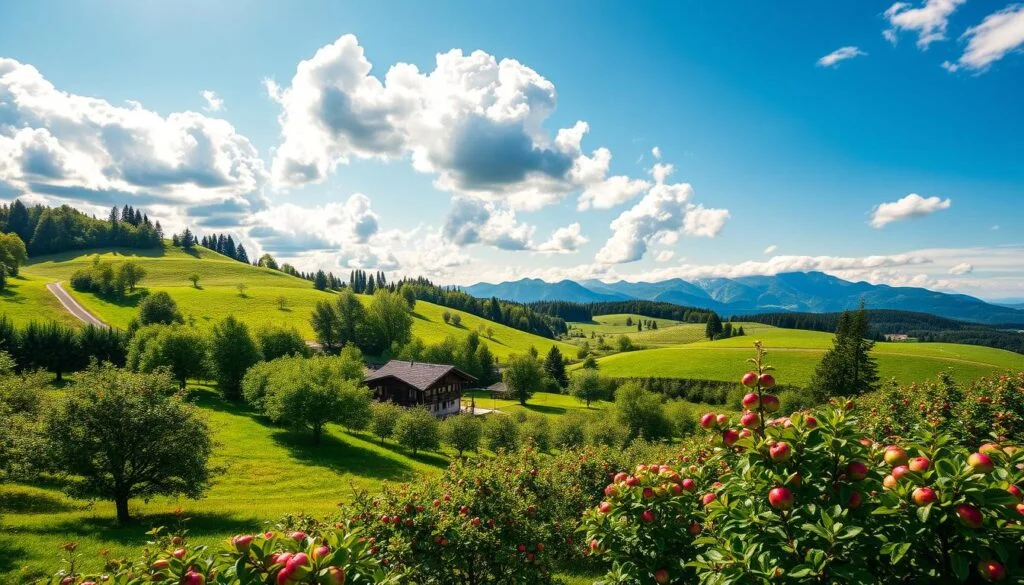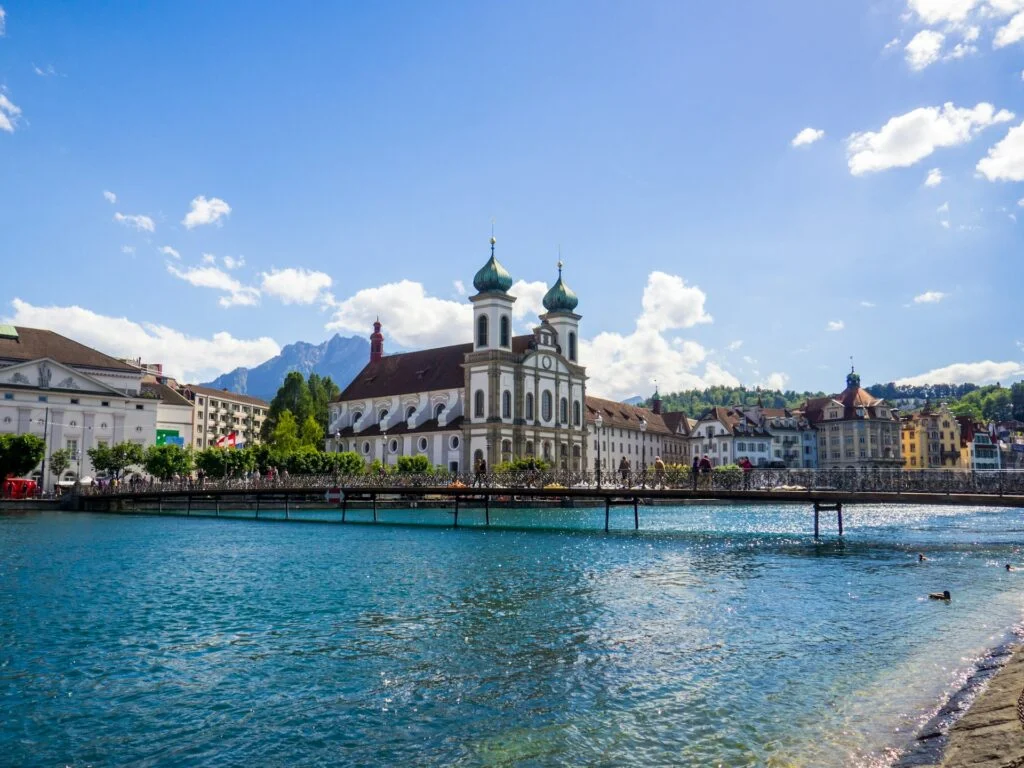The village of Apple Village is settled in the Swiss Alps. It’s a lovely place known for its rich agricultural heritage.
Apple Village also shows the cultural importance of apple farming in Switzerland. It protects heirloom varieties and celebrates the crop with festivals. This place is a true watering place, showing the bond between humans and nature.
If you love fine produce or just want a peaceful break, Apple Village is perfect. It offers a unique look at traditional Swiss agriculture. It’s an exposure to you won’t forget.
Key Takeaways For Apple Village
- Discover the rich agricultural heritage of Switzerland in the interesting village of Apple Village
- Dip yourself in the vibrant tapestry of Swiss tradition, where the art of apple cultivation is deeply woven into the daily life
- learn the cultural significance of apple farming in Switzerland, from the preservation of heirloom varieties to the customs
- Enjoy the fascinating blend of Alpine scenery and bountiful apple orchards that make Apple Village a must-visit destination
- Experience the serene escape and connection to nature that this picturesque village has to offer
Discovering Apple Village Switzerland’s Rich Heritage
Apple Village in Switzerland is a hidden treasure. It shows the country’s deep fruit-growing heritage. For centuries, this area has been key in traditional Swiss farming, with apples being a big part of the local life and economy.
The Origins of Switzerland’s Fruit-Growing Tradition
Apple growing in Switzerland started in the Middle Ages. Monasteries and noble families tried new ways to grow fruits. Over time, farmers got better at their craft, sharing their knowledge with their families.
Historical Evolution of Apple Cultivation
The historical evolution of apple cultivation in Switzerland shows the area’s dedication to farming. New fruit types and farming methods were introduced, marking each era in the Swiss apple history.
Cultural Significance in Swiss Agriculture
Apple farming is a big part of Swiss rural life. It shapes the country’s farming and food traditions. The apple harvest is a big event, bringing people together to celebrate their hard work and the deep-rooted history of apples.
“Apple cultivation is not just an commercial pursuit in Switzerland, but a deeply rooted societal tradition that has resisted the test of time.”
Location and Geography of Switzerland’s Apple Paradise
Apple Village is nestled in the Swiss Alps, a prime Swiss apple-growing region. It’s surrounded by hills, meadows, and mountains. This setting is perfect for growing some of the world’s best apples.
The village’s location in the Swiss countryside is ideal. It has a unique climate and soil, making it famous for Alpine fruit farms. The terrain and soil are great for apple orchards, making the area thrive.
Visitors walking through Apple Village feel like they’re in a different world. The apple groves, old farmhouses, and country lanes create a peaceful scene. This scene has drawn both locals and tourists for years.
Walking through the town or exploring the hills, you feel Apple Village’s bond with nature. This bond has made the community appreciate the Swiss apple-growing tradition. It ensures the village’s heritage will live on for many years.
The Unique Climate That Nurtures Swiss Apple Growth
Switzerland’s Apple Village has a special climate that helps grow amazing apples. The mix of alpine growing conditions and seasonal apple care makes it perfect for fruit.
Microclimate Conditions
The Swiss apple orchards are in unique microclimates. These areas have different levels of sunlight, temperature, and rain. This variety lets them grow many Swiss apple types, each with its own taste.
Seasonal Changes and Apple Production
- The four-season climate in Switzerland’s Apple Village is key for growing apples.
- Spring is when apple trees bloom, starting the harvest season.
- Summer’s warmth helps apples ripen, making them sweet and crisp.
- Autumn’s cool and colorful leaves are perfect for picking apples, keeping them fresh and tasty.
- Winters’ snow lets trees rest and get ready for next year’s growth.
Environmental Factors
| Environmental Factor | Impact on Swiss Apple Growth |
|---|---|
| Soil Composition | The Swiss Alps’ rich, well-drained soils are great for apple trees. |
| Precipitation Levels | The right amount of rain and snow keeps the orchards moist. |
| Elevation and Airflow | The high altitude and gentle breezes create a perfect climate for apples. |
The special climate and natural resources in Switzerland make it ideal for growing Swiss apple microclimates.
Traditional Apple Varieties Found in Swiss Orchards
Apple Village in Switzerland is a treasure trove of unique apples. Each apple has its own story and flavor. From the Berner Rosenapfel to the Grosser Rheintaler Borsdorfer, these apples are the pride of local farmers.
Apple Village also has newer apple varieties. These apples are chosen for their ability to grow well in Switzerland’s climate. The Eiser and Schattenmorelle are favorites for their taste and quality.
These apples have a special bond with the land and people. They carry a history of adaptation and resilience. The orchardists have protected these apples for generations.
- The Berner Rosenapfel is a pink apple with a sweet and tangy taste. It’s loved in Swiss cooking for centuries.
- The Grosser Rheintaler Borsdorfer is a big, juicy apple. It’s known for its complex flavors and keeps well.
- The Eiser is tart and great for cider and baking. The Schattenmorelle is crunchy and versatile.
These Swiss apple varieties are more than just fruits. They show the region’s rich farming history. They symbolize the connection between the land, people, and their work.
Sustainable Farming Practices in Apple Village
In the Swiss countryside, Apple Village’s orchards lead the way in sustainable farming. They mix old wisdom with new methods to grow apples. This approach keeps their land and environment healthy for the future.
Organic Cultivation Methods
Apple Village orchards use organic farming. They avoid harmful chemicals and choose natural options instead. This way, they keep their trees strong and the ecosystem balanced.
Water Conservation Techniques
Water is very important in the Alps. Apple Village farmers use smart ways to save water. They have special irrigation systems and use rainwater wisely.
Pest Management Strategies
Apple Village farmers don’t use chemicals to fight pests. They use natural methods like attracting good bugs and physical barriers. This keeps their sustainable Swiss farming and organic apple orchards healthy.
Local Products and Apple-Based Delicacies
In the heart of Apple Village, Switzerland, local artisans and producers have made the most of the region’s apple harvest. They create delicious Swiss apple products and traditional specialties.
Visitors to Apple Village can enjoy the most flavorful Swiss apple products. These are picked from the lush orchards around. Local cider-makers make exceptional artisanal apple goods, from dry ciders to sweet, sparkling ones. Each cider shows off the region’s unique topical identity.
Apple juice, pressed on-site, is a refreshing taste of the countryside. Bakers in the village use traditional Swiss apple recipes in their pastries and desserts.
The culinary creativity in Apple Village goes beyond apples. Traditional Swiss dishes like apple tart, alpine herdsmen’s macaroni and melted Swiss cheese often include the region’s prized apples. These apples add depth and balance to these beloved dishes.
Whether you enjoy a crunchy apple from the orchard or a decadent apple-based dessert, Apple Village offers a true taste of Switzerland. It showcases the region’s apple-growing heritage and the handmade passion behind these delicious products.
Visitor Experiences and Tourism Activities
Apple Village is in the heart of Switzerland’s apple country. It offers many visitor experiences that show the rich heritage and traditions of Swiss apple tourism. Guests can enjoy seasonal orchard tours and fun apple-themed activities. This place lets travelers connect deeply with the region’s farming history.
Seasonal Apple Picking Tours
Visiting Apple Village means getting to see the beautiful orchards and pick apples yourself. The orchard trip give a close look at how apples are grown. It’s a chance to value the hard work that goes into it.
Culinary Workshops
Apple Village also has culinary workshops focused on apples. Guests can learn to make apple pies and cider. These workshops are a tasty way to explore local food.
Farm-to-Table Events
The farm-to-table events at Apple Village connect the land to the table. Guests enjoy meals made from newly harvested, local ingredients. It’s a great way to experience Swiss apple tourism.
| Activity | Description | Duration |
|---|---|---|
| Seasonal Apple Picking Tours | Guided tours of the picturesque orchards, allowing visitors to handpick the freshest apples | 1-2 hours |
| Culinary Workshops | Hands-on classes on traditional apple-based recipes and cider production | 2-3 hours |
| Farm-to-Table Events | Immersive dining experiences showcasing the region’s finest locally sourced ingredients | 2-3 hours |
Apple Village offers a wide range of apple-themed activities. It invites visitors to relate with the land, people, and traditions of this special part of Switzerland.
Economic Impact on Local Communities
The Swiss apple industry is key to the economy in rural areas. Apple Village, in Switzerland’s countryside, shows how it helps local people and businesses.
Apple Village’s apple farming and tourism create jobs. People work in orchards and make cider. This brings steady income to families, making the community stable.
| Economic Indicator | Positive Impact |
|---|---|
| Job Creation | Orchards, cider production, culinary workshops, and tourism-related services |
| Income Generation | Steady wages, increased household spending, and investment in local businesses |
| Tax Revenue | Contributions to municipal and regional budgets, supporting public services |
| Business Development | Growth of apple-related enterprises, diversification of the local economy |
Rural tourism in Apple Village boosts the local economy. Visitors help local businesses grow. This makes the community stronger.
The village’s green practices, like organic farming, protect the environment. They also help farmers and the community thrive. This leads to a better future for everyone.

Apple Village’s success shows the power of rural tourism and sustainable community development. They drive growth and progress in Switzerland’s countryside.
Conclusion Of Apple Village
The Apple Village of Switzerland is a magical place. It shows the country’s deep love for farming and care for the environment. This village is a key part of Switzerland’s history and culture.
Switzerland’s apple farming has a long and rich history. Today, farmers use new methods to grow apples. They work hard to keep the old ways alive, making sure the apples are delicious and the land stays healthy.
Apple Village is a model for the world. It shows how farming can be green and keep traditions alive. The farmers here use special methods to grow apples. They care for the land and make sure the apples are tasty.
Apple Village offers a variety of experiences for visitors. These include guided woodlet tours, apple-picking activities, culinary workshops, and farm-to-table events. These experiences let tourists connect with local traditions and value the apple-growing process.




